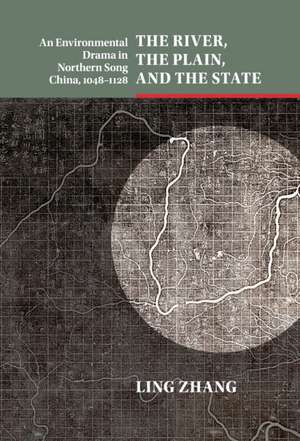The River, the Plain, and the State: An Environmental Drama in Northern Song China, 1048–1128: Studies in Environment and History
Autor Ling Zhangen Limba Engleză Hardback – 8 sep 2016
| Toate formatele și edițiile | Preț | Express |
|---|---|---|
| Paperback (1) | 289.78 lei 6-8 săpt. | |
| Cambridge University Press – 13 mar 2019 | 289.78 lei 6-8 săpt. | |
| Hardback (1) | 689.91 lei 6-8 săpt. | |
| Cambridge University Press – 8 sep 2016 | 689.91 lei 6-8 săpt. |
Din seria Studies in Environment and History
-
 Preț: 231.59 lei
Preț: 231.59 lei -
 Preț: 191.12 lei
Preț: 191.12 lei -
 Preț: 243.02 lei
Preț: 243.02 lei -
 Preț: 188.70 lei
Preț: 188.70 lei -
 Preț: 204.55 lei
Preț: 204.55 lei -
 Preț: 147.64 lei
Preț: 147.64 lei -
 Preț: 201.67 lei
Preț: 201.67 lei -
 Preț: 137.74 lei
Preț: 137.74 lei - 14%
 Preț: 771.56 lei
Preț: 771.56 lei -
 Preț: 231.54 lei
Preț: 231.54 lei -
 Preț: 156.89 lei
Preț: 156.89 lei -
 Preț: 239.72 lei
Preț: 239.72 lei -
 Preț: 200.99 lei
Preț: 200.99 lei -
 Preț: 206.52 lei
Preț: 206.52 lei -
 Preț: 199.05 lei
Preț: 199.05 lei -
 Preț: 431.15 lei
Preț: 431.15 lei -
 Preț: 322.04 lei
Preț: 322.04 lei -
 Preț: 204.48 lei
Preț: 204.48 lei -
 Preț: 299.23 lei
Preț: 299.23 lei -
 Preț: 332.81 lei
Preț: 332.81 lei -
 Preț: 239.55 lei
Preț: 239.55 lei -
 Preț: 225.79 lei
Preț: 225.79 lei -
 Preț: 285.93 lei
Preț: 285.93 lei -
 Preț: 270.25 lei
Preț: 270.25 lei -
 Preț: 208.68 lei
Preț: 208.68 lei -
 Preț: 275.85 lei
Preț: 275.85 lei -
 Preț: 323.05 lei
Preț: 323.05 lei -
 Preț: 234.83 lei
Preț: 234.83 lei -
 Preț: 272.97 lei
Preț: 272.97 lei - 11%
 Preț: 528.82 lei
Preț: 528.82 lei - 11%
 Preț: 432.64 lei
Preț: 432.64 lei -
 Preț: 252.69 lei
Preț: 252.69 lei -
 Preț: 278.72 lei
Preț: 278.72 lei - 14%
 Preț: 756.70 lei
Preț: 756.70 lei -
 Preț: 264.09 lei
Preț: 264.09 lei -
 Preț: 440.76 lei
Preț: 440.76 lei
Preț: 689.91 lei
Preț vechi: 802.22 lei
-14% Nou
Puncte Express: 1035
Preț estimativ în valută:
132.03€ • 137.06$ • 110.09£
132.03€ • 137.06$ • 110.09£
Carte tipărită la comandă
Livrare economică 22 martie-05 aprilie
Preluare comenzi: 021 569.72.76
Specificații
ISBN-13: 9781107155985
ISBN-10: 1107155983
Pagini: 328
Ilustrații: 14 maps 6 tables
Dimensiuni: 160 x 235 x 24 mm
Greutate: 0.6 kg
Editura: Cambridge University Press
Colecția Cambridge University Press
Seria Studies in Environment and History
Locul publicării:New York, United States
ISBN-10: 1107155983
Pagini: 328
Ilustrații: 14 maps 6 tables
Dimensiuni: 160 x 235 x 24 mm
Greutate: 0.6 kg
Editura: Cambridge University Press
Colecția Cambridge University Press
Seria Studies in Environment and History
Locul publicării:New York, United States
Cuprins
Prologue. 1048: the opening of an environmental drama; Part I. Pre-1048: Prelude to the Environmental Drama: 1. Before the Yellow River met the Hebei Plain; 2. The state's Hebei project; 3. The 1040s: on the eve of the flood; 4. Creating a delta landscape; Part II. Post-1048: The Unfolding of the Environmental Drama: 5. Managing the Yellow River-Hebei environmental complex; 6. Life in the Yellow River Delta; 7. Agriculture: a subsistence-oriented economy; 8. Land and water: a thousand years of environmental trauma; Epilogue. 1128: the close of the environmental drama; Index.
Recenzii
'If you want a striking, documented, and even lyrical account of why the Yellow River is called 'China's Sorrow,' this is the book for you. Full of hydrological wisdom, fateful decisions of Northern Song imperial officials, a river with 'agency' of its own to spare, human tragedy, deep environmental history, and vivid voices from a millennium ago, it is bound to have cross-disciplinary reach. Let's call it a landmark study of a river.' James C. Scott, Yale University, Connecticut
'This remarkable book reveals how a single catastrophe a thousand years ago devastated two ecological regions, sent an entire regime into crisis, and instigated a series of events that reverberated across a millennium of history throughout all of East Asia. It should be required reading for environmental historians and historians of China, and it offers lessons to anyone interested in the long term effects of ecological upheavals today.' Ruth Mostern, University of California, Merced
'This book is a ground-shifting study that surveys an altered terrain of socio-political relations as founded on environmental interactions. By focusing on state-society commitment to a distinctive set of inherently unstable environmental relations, termed 'the hydraulic mode of consumption', Zhang's book offers an innovative analytical approach applicable to much of the subsequent history of imperial China.' David A. Bello, Washington and Lee University, Virginia
'Ling Zhang constructs a masterly account of state policies, natural processes, and the lived experience of millions of Chinese people. She writes with insight, drama, and compassion. This riveting narrative changes our view of Chinese environmental history like no other previous work. All students of China, and of environmental history anywhere, must read it.' Peter C. Perdue, Yale University, Connecticut
'Professor Zhang belongs to a new generation of environmental historians whose stunning research provides such new perspectives on Chinese history that existing narratives will have to be re-conceptualized. The drama at the center of this book is breathtaking in its implications for the subsequence course of China's history.' Robert B. Marks, Whittier College, California
'A bold and innovative study that makes important contributions to scholarship on Middle-Period China, environmental history, and Yellow River management. Her focus on the eighty-year period when the Yellow River occupied the Hebei Plain, bringing devastation to Hebei's land, water system, and people and ultimately undermining the stability of the Northern Song state, complicates in provocative ways existing literature on the Tang-Song transition as a time of great economic prosperity, demographic growth, and technological innovation.' Kathryn Edgerton-Tarpley, San Diego State University
'Given the salience of large dam projects and river engineering across Asia today, stretching from the Yangtze and Mekong to South Asia and beyond, this is a timely and deeply insightful work … This is a rare work where the epic scale is enriched throughout by attention to lost and forgotten voices. Hebei Province, where waters broke loose and played havoc, is central to the work, but it is looked at in a way that 'the stories of those who lost in the game of history were the hidden companion of growth'.' Mahesh Rangarajan, H-Asia
'This remarkable book reveals how a single catastrophe a thousand years ago devastated two ecological regions, sent an entire regime into crisis, and instigated a series of events that reverberated across a millennium of history throughout all of East Asia. It should be required reading for environmental historians and historians of China, and it offers lessons to anyone interested in the long term effects of ecological upheavals today.' Ruth Mostern, University of California, Merced
'This book is a ground-shifting study that surveys an altered terrain of socio-political relations as founded on environmental interactions. By focusing on state-society commitment to a distinctive set of inherently unstable environmental relations, termed 'the hydraulic mode of consumption', Zhang's book offers an innovative analytical approach applicable to much of the subsequent history of imperial China.' David A. Bello, Washington and Lee University, Virginia
'Ling Zhang constructs a masterly account of state policies, natural processes, and the lived experience of millions of Chinese people. She writes with insight, drama, and compassion. This riveting narrative changes our view of Chinese environmental history like no other previous work. All students of China, and of environmental history anywhere, must read it.' Peter C. Perdue, Yale University, Connecticut
'Professor Zhang belongs to a new generation of environmental historians whose stunning research provides such new perspectives on Chinese history that existing narratives will have to be re-conceptualized. The drama at the center of this book is breathtaking in its implications for the subsequence course of China's history.' Robert B. Marks, Whittier College, California
'A bold and innovative study that makes important contributions to scholarship on Middle-Period China, environmental history, and Yellow River management. Her focus on the eighty-year period when the Yellow River occupied the Hebei Plain, bringing devastation to Hebei's land, water system, and people and ultimately undermining the stability of the Northern Song state, complicates in provocative ways existing literature on the Tang-Song transition as a time of great economic prosperity, demographic growth, and technological innovation.' Kathryn Edgerton-Tarpley, San Diego State University
'Given the salience of large dam projects and river engineering across Asia today, stretching from the Yangtze and Mekong to South Asia and beyond, this is a timely and deeply insightful work … This is a rare work where the epic scale is enriched throughout by attention to lost and forgotten voices. Hebei Province, where waters broke loose and played havoc, is central to the work, but it is looked at in a way that 'the stories of those who lost in the game of history were the hidden companion of growth'.' Mahesh Rangarajan, H-Asia
Notă biografică
Descriere
This book explores the human-engineered flooding of China's Yellow River, and how it affected the state, environment, and inhabitants of the region.












